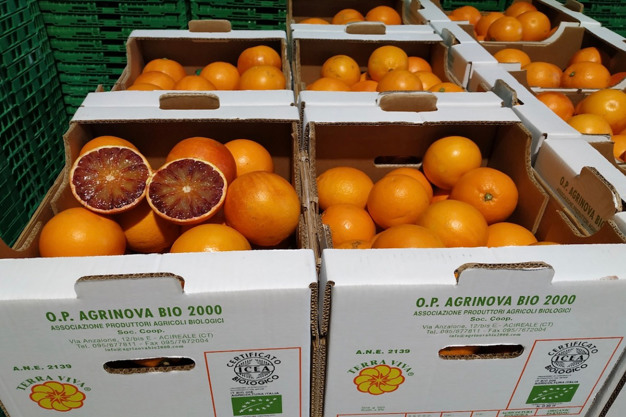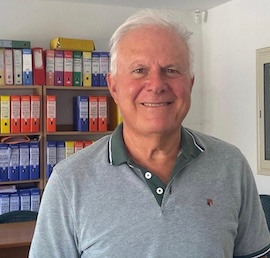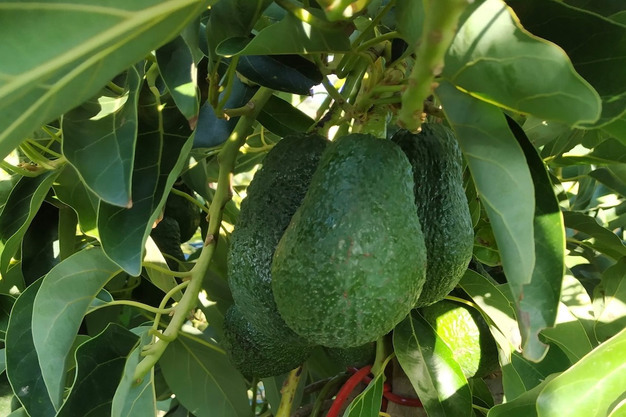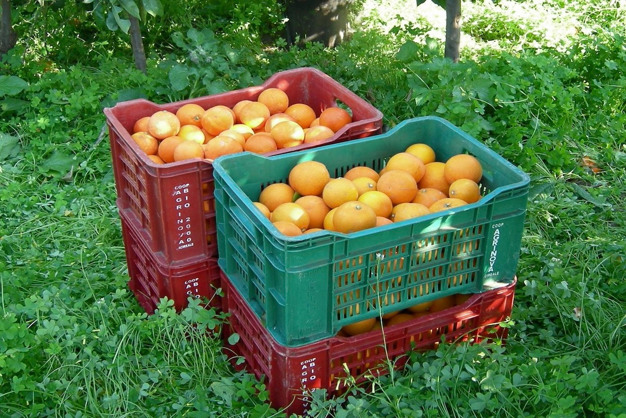 "We are in the middle of the Sicilian citrus campaign, with production volumes at the same level as in previous years, although the sizes are medium to small. In general, although we have not seen any rotting on the farm, there are some problems with the fruit due to the rain and high humidity. Our customers are very satisfied for a number of reasons: Firstly, we ship the citrus in its natural state, without any post-harvest treatment; and secondly, we did not get caught up in the frenzy of starting the first cuts at the wrong time. It is essential to harvest the citrus fruit at the optimum point of ripeness, when acidity and Brix are at least at the organoleptic level typical of the fruit," explains Francesco Ancona, agronomist and technical manager of OP Agrinova Bio 2000.
"We are in the middle of the Sicilian citrus campaign, with production volumes at the same level as in previous years, although the sizes are medium to small. In general, although we have not seen any rotting on the farm, there are some problems with the fruit due to the rain and high humidity. Our customers are very satisfied for a number of reasons: Firstly, we ship the citrus in its natural state, without any post-harvest treatment; and secondly, we did not get caught up in the frenzy of starting the first cuts at the wrong time. It is essential to harvest the citrus fruit at the optimum point of ripeness, when acidity and Brix are at least at the organoleptic level typical of the fruit," explains Francesco Ancona, agronomist and technical manager of OP Agrinova Bio 2000.
The farms of the 61 members of the OP Agrinova Bio 2000 cover a cultivated area of 616 hectares, of which 55% is allocated to citrus fruit, mainly oranges, lemons and clementines. Around 10% is devoted to vegetables, both open field and protected, 10% to various fruit and nut trees, 5% to tropical fruit (avocado), which is gradually increasing as a result of climate change, 5% to olives, and the rest to herbaceous crops (15%). The average size of member farms is around 10 hectares. Many of them are combined farms, with agritourism and/or educational activities.

 "The prolonged drought is affecting many Sicilian producers, some of whom have been forced to abandon their fields," says Biagio Pulvirenti, president of the cooperative. "In general, we are demoralised, mainly because of the lack of a policy, which has left our sector in total isolation, with no long-term planning and with compounded problems. In a context where production costs are rising to the point where they exceed income, producers are reacting as best they can. On the production front, there has been an increase in the planting of tropical fruits, with a particular increase in the planting of avocados by cooperative members. This is a much sought-after fruit that is increasingly being planted in place of lemons, which have been at an all-time low in recent years. The price of the organic Sicilian avocado is very profitable: Our cooperative customers pay an average of 5 euros per kilo," he says.
"The prolonged drought is affecting many Sicilian producers, some of whom have been forced to abandon their fields," says Biagio Pulvirenti, president of the cooperative. "In general, we are demoralised, mainly because of the lack of a policy, which has left our sector in total isolation, with no long-term planning and with compounded problems. In a context where production costs are rising to the point where they exceed income, producers are reacting as best they can. On the production front, there has been an increase in the planting of tropical fruits, with a particular increase in the planting of avocados by cooperative members. This is a much sought-after fruit that is increasingly being planted in place of lemons, which have been at an all-time low in recent years. The price of the organic Sicilian avocado is very profitable: Our cooperative customers pay an average of 5 euros per kilo," he says.
"On the whole, farms in the south are unable to compete on the market, despite the excellent quality of their products. This is due to the high costs of production, from the transportation to the cost of water for irrigation, to energy costs, to an increasingly hard-to-find labour force, to social security and tax contributions."

"We are in the midst of climate change," explains Ancona. "It is a fact, to the point that the current temperatures are above average for the period, to the extent that we are irrigating to compensate for the drought; the reservoirs are dry and so are the soils. As a result, Sicily has been declared an area in danger of drought and desertification, and the range of fruit has changed over the years. We are currently harvesting pumpkins and courgettes, and in a few weeks we will start with fennel and artichokes. Vegetables grown organically in open fields include potatoes, tomatoes, onions, carrots and squash."
In such a complex situation, what is striking is the resilience of the organic farms affiliated to Agrinova, which, thanks to the application of regenerative farming techniques developed over the years, have achieved levels of soil organic substance ranging between 2% and 6%, whereas the average Sicilian soil is around 1% and is therefore in the process of desertification.

"The decrease in the consumption of organic products in Italy in 2023 is due to a general decline, but also to an insufficient promotion and support policy, especially in the public catering sector. At the moment we are seeing an increase in sales of organic citrus fruit, although prices have fallen significantly compared to the beginning of November; most of the product comes from Spain, but also from Turkey, Egypt and Morocco, through trade with some large northern European suppliers."
"Agrinova Bio 2000's distribution channels are made up of specialised shops, local supermarkets and 40 solidarity purchasing groups, a dozen of which are distributed throughout the Iberian Peninsula (mainly in the northern regions) and the rest throughout Europe. Our aim is to sell through diversified commercial channels in order to promote alternative sales; part of our citrus production is also destined for school canteens and, in recent years, the e-commerce service has also been activated for Italy, with delivery within 48 hours of placing the order."
For more information:
OP Agrinova Bio 2000
Tel.: +39 095 877811
[email protected]
www.agrinovabio2000.it
